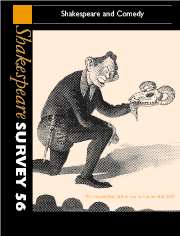Book contents
- Frontmatter
- Looking Like a Child – or – Titus: The Comedy
- Comedy and Epyllion in Post-Reformation England
- (Peter) Quince: Love Potions, Carpenter’s Coigns and Athenian Weddings
- ‘When Everything Seems Double’: Peter Quince, the other Playwright in A Midsummer Night's Dream
- Cultural Materialism and Intertextuality: The Limits of Queer Reading in A Midsummer Night's Dream and The Two Noble Kinsmen
- As You Liken It: Simile in the Wilderness
- Infinite Jest: The Comedy of Hamlet, Prince of Denmark
- Othello and the End of Comedy
- Shakespeare as a Joke: The English Comic Tradition, A Midsummer Night’s Dream and Amateur Performance
- Falstaff’s Belly, Bertie’s Kilt, Rosalind’s Legs: Shakespeare and the Victorian Prince
- The Sixth Act: Shakespeare after Joyce
- The Return of Prospero’s Wife: Mother Figures in The Tempest’s Afterlife
- Directing Shakespeare’s Comedies: In Conversation with Peter Holland
- ‘To Show our Simple Skill’: Scripts and Performances in Shakespearian Comedy
- John Shakespeare’s ‘Spiritual Testament’: A Reappraisal
- Shakespeare as a Force for Good
- Timon of Athens and Jacobean Politics
- Man, Woman and Beast in Timon’s Athens
- Rough Magic: Northern Broadsides at Work at Play
- Shakespeare Performances in England, 2002
- Professional Shakespeare Productions in the British Isles January–December 2001
- The Year's Contributions to Shakespearian Study 1 Critical Studies
- 2 Shakespeare’s Life, Times and Stage
- 3 Editions and Textual Studies
- Books Received
- Index
John Shakespeare’s ‘Spiritual Testament’: A Reappraisal
Published online by Cambridge University Press: 28 March 2007
- Frontmatter
- Looking Like a Child – or – Titus: The Comedy
- Comedy and Epyllion in Post-Reformation England
- (Peter) Quince: Love Potions, Carpenter’s Coigns and Athenian Weddings
- ‘When Everything Seems Double’: Peter Quince, the other Playwright in A Midsummer Night's Dream
- Cultural Materialism and Intertextuality: The Limits of Queer Reading in A Midsummer Night's Dream and The Two Noble Kinsmen
- As You Liken It: Simile in the Wilderness
- Infinite Jest: The Comedy of Hamlet, Prince of Denmark
- Othello and the End of Comedy
- Shakespeare as a Joke: The English Comic Tradition, A Midsummer Night’s Dream and Amateur Performance
- Falstaff’s Belly, Bertie’s Kilt, Rosalind’s Legs: Shakespeare and the Victorian Prince
- The Sixth Act: Shakespeare after Joyce
- The Return of Prospero’s Wife: Mother Figures in The Tempest’s Afterlife
- Directing Shakespeare’s Comedies: In Conversation with Peter Holland
- ‘To Show our Simple Skill’: Scripts and Performances in Shakespearian Comedy
- John Shakespeare’s ‘Spiritual Testament’: A Reappraisal
- Shakespeare as a Force for Good
- Timon of Athens and Jacobean Politics
- Man, Woman and Beast in Timon’s Athens
- Rough Magic: Northern Broadsides at Work at Play
- Shakespeare Performances in England, 2002
- Professional Shakespeare Productions in the British Isles January–December 2001
- The Year's Contributions to Shakespearian Study 1 Critical Studies
- 2 Shakespeare’s Life, Times and Stage
- 3 Editions and Textual Studies
- Books Received
- Index
Summary
The document known to us as John Shakespeare’s ‘Spiritual Testament’, allegedly discovered during repairs in the 1750s to the roof of the house in which he once lived, is perhaps the greatest weapon in the arsenal of those who maintain that Shakespeare’s father remained a practising Catholic; and, if he did, that his son must at least have been reared in the Catholic faith. Moreover, it has been claimed, John’s subscription to this ‘testament’ can be dated to 1580 or 1581, the years of the Jesuit mission into England, led by Edmund Campion and Robert Parsons, thus bringing the Shakespeare family, during William’s formative years, into close contact with dangerous Catholic conspirators. However, there are difficulties to overcome if we are to accept the document’s authenticity, let alone its Jesuit associations; and even if we could, this would not establish that Shakespeare remained loyal to the Catholic church in later years. Be that as it may, it is the purpose of this essay to subject the ‘Spiritual Testament’ to close critical examination in an effort to determine whether it can indeed be safely used in the debate over Shakespeare’s religious beliefs.
- Type
- Chapter
- Information
- Shakespeare SurveyAn Annual Survey of Shakespeare Studies and Production, pp. 184 - 202Publisher: Cambridge University PressPrint publication year: 2003
- 3
- Cited by

